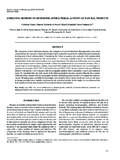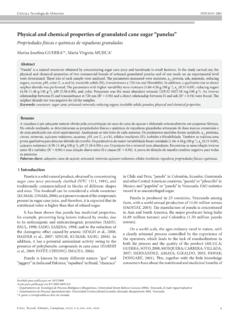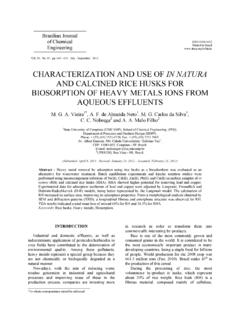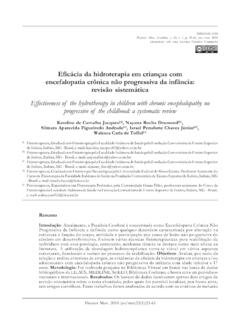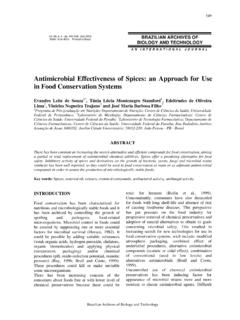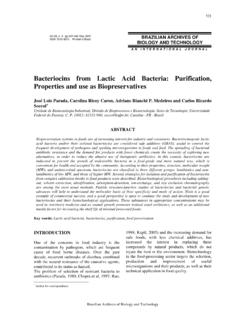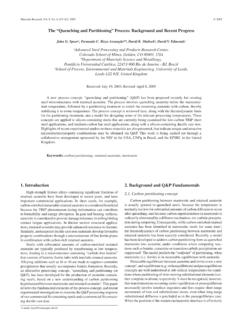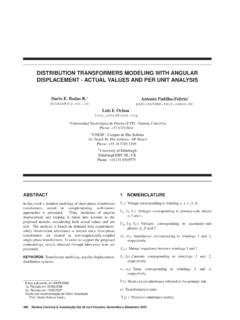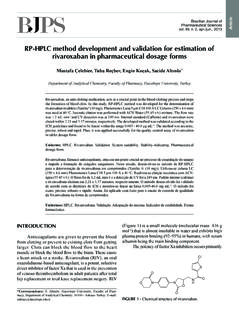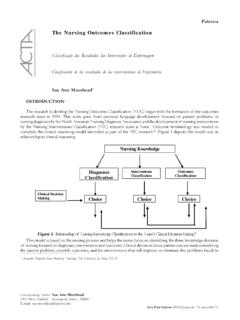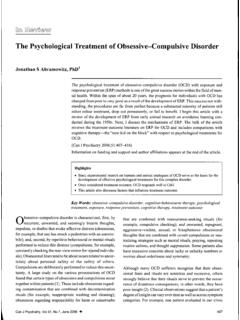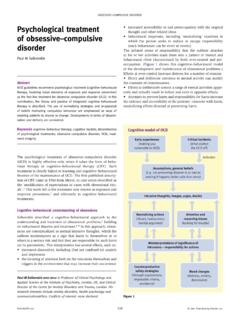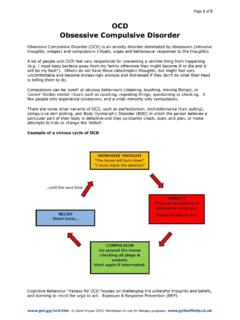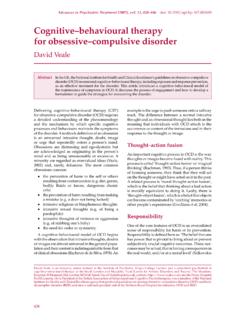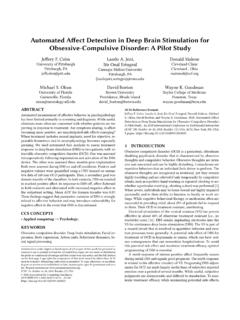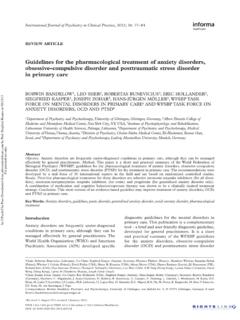Transcription of Family approaches to treatment for obsessive compulsive ...
1 43 Rev Bras Psiquiatr 2003;25(1):43-50 IntroductionThis paper will focus on Family aspects that pertain to be-havioral treatments for adults with obsessive compulsive dis-order (OCD). Although Family is particularly important forrevis oFamily approaches to treatment for obsessivecompulsive disorderAbordagem familiar no tratamento do transtorno obsessivo-compulsivoGail Steketeea and Barbara Van NoppenbaBoston University School of Social Work. Boston, MA, United States. bBrown University Department of Psychiatry. Providence, RI, United StatesNone finacial support and conflict of article for Brazilian Journal of Psychiatry (Revista Brasileira de Psiquiatria)Recieved on 15/10/2002.
2 Reviewed on 6/11/2002. Approved on 6/11 article reviews the Family constellation of patients with obsessive compulsive disorder (OCD), the presenceof OCD symptoms among Family members, and familial aspects including parental attachment, expressed emotion(EE), and Family accommodation. Some evidence supports a negative effect of hostility, emotional over-involvement,and criticism perceived by the patient on behavioral treatment outcome. However, actual criticism observed by therelative during an interview was associated with more benefit from therapy. Family accommodation predictedpoorer Family functioning and more severe OCD symptoms after behavioral treatment .
3 A review of the limitedtreatment literature indicates no actual tests of the effects of psycho-educational and supportive treatments, althoughseveral reports suggest they are useful for families and patients. Including relatives in treatment has proved beneficialin some studies, especially with children, but not in others. Multiple Family groups that focus on behavioral contractingfor exposure and stopping rituals may be a promising intervention. Likewise, efforts to reduce Family accommodationin the context of behavioral treatment have proved useful. Additional research on the content, process and effectsof Family interventions for OCD is much Expressed emotion.
4 Behavior therapy. Family intervention. Exposure and response artigo revisa a constela o familiar dos pacientes com transtorno obsessivo-compulsivo (TOC), a presen a desintomas obsessivo-compulsivo entre os familiares e aspectos familiares como relacionamento parental,expressividade emocional e acomoda o familiar. Algumas evid ncias sugerem que a hostilidade, o envolvimentoemocional excessivo e criticismo observados pelo paciente t m um impacto negativo no seguimento do tratamentocomportamental. No entanto, o criticismo, observado nos pais durante a entrevista, t m sido relacionado commelhor efic cia do tratamento comportamental. A acomoda o dos familiares frente aos sintomas prediz um fun-cionamento familiar mais pobre, assim como maior gravidade do TOC depois do tratamento existam artigos sugerindo a utilidade de interven es psico-educacionais e tratamentos de apoio, n oexistem trabalhos que tenham verificado a efic cia desses procedimentos.
5 Incluir os familiares no programa detratamento tem sido ben fico segundo alguns trabalhos, embora n o confirmado em grupos com v riasfam lias, dirigidos programa o da interven o comportamental, podem ser uma interven o promissora. Buscara diminui o da acomoda o familiar frente aos sintomas, dentro de um contexto de interven o comportamental,t m tamb m se mostrado til. Pesquisas adicionais dirigidas s interven es familiares no TOC s o necess Emo es manifestas. Behavior therapy. Interven o familiar. Exposi o e resposta preven and adolescents with this disorder, the issues aresomewhat different than for adults and will not be addressedhere.
6 In this paper we will review findings from the researchliterature regarding genetic and familial relationships in theRev Bras Psiquiatr 2003;25(1):43-5044 Tratamento TOC: abordagem familiarSteketee G & Van Noppen Bthese findings mean that most adults who present for treatmentwill have grown up living with parents who themselves havesome form of anxiety or depression. However, the limited in-formation available indicates that relatives depression andanxiety symptoms are not significantly related to patients OCDsymptoms or As noted above, some patients withOCD will have grown up in households where parents alsohad this disorder. However, when OCD does occur in parentsand their children, the symptom patterns are often example, parents who have fears of harming and checkingrituals may have children with washing rituals.
7 This findingargues against observational learning as a major mode of trans-mission of OCD symptoms, though it is still possible that somegeneral attitudes are learned in this way, such as excessiveavoidance of danger or perfectionistic tendencies. Much re-mains to be learned about the relationship of these personalitypatterns and beliefs to OCD symptoms, although some studieshave reported that the parents of those with OCD frequentlyexhibit such ,15 Parental bondingTo study attachment to parents, Chambless, Gillis,Steketee, and Tran16 asked 52 adult OCD and 35 patientswith panic and agoraphobia and their mothers and fathers tocomplete the Parental Bonding Instrument (PBI) whichmeasures care and overprotection.
8 Not surprisingly, clientsrated parents more negatively than parents rated themselves,especially for maternal overprotection and paternal were most likely to describe their parenting as hav-ing been optimal (46% mothers, 42% fathers), whereas cli-ents most often reported affectionless control to have beenmost typical ( of mothers and of fathers). Cli-ents had a more global view of parental behavior in thatthey rated mothers and fathers similarly on care, whereascorrelations between mothers and fathers ratings ap-proached zero. Parents and their adult anxious children ap-pear to have different views on past parental behavior.
9 Theseclients global view of their parents styles (both were ratedsimilarly) suggests that the clients ratings may have moreto do with their perceptions than with their parents behav-ior. Although patient ratings of their parents were not re-lated to mood or other pathology, poor social adjustmentcorrelated with low parental care and more relationships were found for anxious cluster per-sonality traits and parental upbringing. More avoidant anddependent traits were found in clients who reported lowermaternal care, whereas more dependent and passive-aggres-sive traits were found in those reporting higher maternaloverprotectiveness.
10 Ratings of fathers bonding were not re-lated to anxious personality traits. Overall, these findings sug-gest that poor parental bonding constitutes a general risk fac-tor for psychopathology, rather than anxiety or OCD in par-ticular. The finding that relationships were more apparent formaternal (especially care) rather than paternal variables is notsurprising in a country where mothers are overwhelminglylikely to be the primary caretakers. Over-controlling parentsfamily of origin and how OCD affects families. In addition,several studies investigate Family predictors of treatment out-come, especially Family members expression of emotion, andthe effects of including Family members in treatment .
